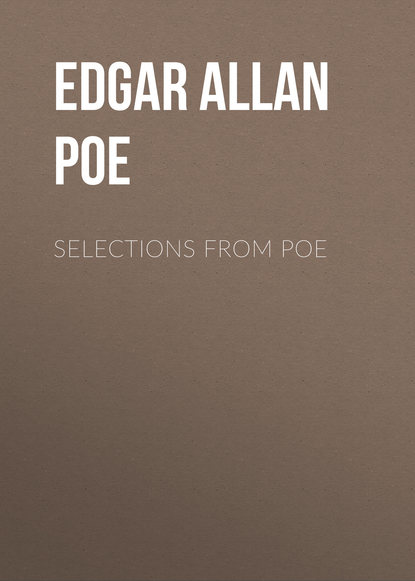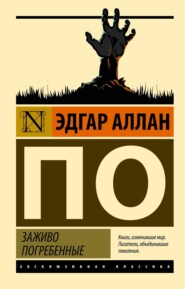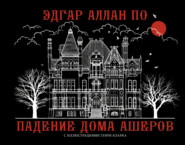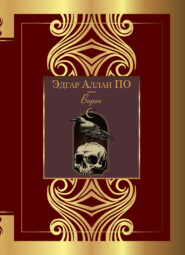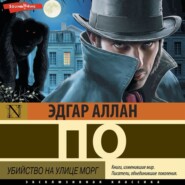По всем вопросам обращайтесь на: info@litportal.ru
(©) 2003-2024.
✖
Selections from Poe
Настройки чтения
Размер шрифта
Высота строк
Поля
"But," said I, "the enigma seems still in as bad a condition as ever. How is it possible to extort a meaning from all this jargon about 'devil's seats,' 'death's-heads,' and 'bishop's hotels'?"
"I confess," replied Legrand, "that the matter still wears a serious aspect, when regarded with a casual glance. My first endeavor was to divide the sentence into the natural division intended by the cryptographist."
"You mean, to punctuate it?"
"Something of that kind."
"But how was it possible to effect this?"
"I reflected that it had been a point with the writer to run his words together without division, so as to increase the difficulty of solution. Now, a not over-acute man, in pursuing such an object, would be nearly certain to overdo the matter. When, in the course of his composition, he arrived at a break in his subject which would naturally require a pause, or a point, he would be exceedingly apt to run his characters, at this place, more than usually close together. If you will observe the MS., in the present instance, you will easily detect five such cases of unusual crowding. Acting on this hint, I made the division thus:
"'_A good glass in the bishop's hostel in the devil's seat – twenty-one degrees and thirteen minutes – northeast and by north – main branch seventh limb east side – shoot from the left eye of the deaths-head – a
bee line from the tree through the shot fifty feet out_.'"
"Even this division," said I, "leaves me still in the dark."
"It left me also in the dark," replied Legrand, "for a few days; during which I made diligent inquiry, in the neighborhood of Sullivan's Island, for any building which went by the name of the 'Bishop's Hotel'; for, of course, I dropped the obsolete word 'hostel.' Gaining no information on the subject, I was on the point of extending my sphere of search, and proceeding in a more systematic manner, when one morning it entered into my head, quite suddenly, that this 'Bishop's Hostel' might have some reference to an old family, of the name of Bessop, which, time out of mind, had held possession of an ancient manor-house, about four miles to the northward of the island. I accordingly went over to the plantation, and reinstituted my inquiries among the older negroes of the place. At length one of the most aged of the women said that she had heard of such a place as Bessop's Castle, and thought that she could guide me to it, but that it was not a castle, nor a tavern, but a high rock.
"I offered to pay her well for her trouble, and, after some demur, she consented to accompany me to the spot. We found it without much difficulty, when, dismissing her, I proceeded to examine the place. The 'castle' consisted of an irregular assemblage of cliffs and rocks – one of the latter being quite remarkable for its height as well as for its insulated and artificial appearance. I clambered to its apex, and then felt much at a loss as to what should be next done.
"While I was busied in reflection, my eyes fell on a narrow ledge in the eastern face of the rock, perhaps a yard below the summit upon which I stood. This ledge projected about eighteen inches, and was not more than a foot wide, while a niche in the cliff just above it gave it a rude resemblance to one of the hollow-backed chairs used by our ancestors. I made no doubt that here was the 'devil's seat' alluded to in the MS., and now I seemed to grasp the full secret of the riddle.
"The 'good glass,' I knew, could have reference to nothing but a telescope; for the word 'glass' is rarely employed in any other sense by seamen. Now here, I at once saw, was a telescope to be used, and a definite point of view, admitting no variation, from which to use it. Nor did I hesitate to believe that the phrases, 'twenty-one degrees and thirteen minutes,' and 'northeast and by north,' were intended as directions for the levelling of the glass. Greatly excited by these discoveries, I hurried home, procured a telescope, and returned to the rock.
"I let myself down to the ledge, and found that it was impossible to retain a seat on it unless in one particular position. This fact confirmed my preconceived idea. I proceeded to use the glass. Of course, the 'twenty-one degrees and thirteen minutes' could allude to nothing but elevation above the visible horizon, since the horizontal direction was clearly indicated by the words, 'northeast and by north.' This latter direction I at once established by means of a pocket-compass; then, pointing the glass as nearly at an angle of twenty-one degrees of elevation as I could do it by guess, I moved it cautiously up or down, until my attention was arrested by a circular rift or opening in the foliage of a large tree that over-topped its fellows in the distance. In the centre of this rift I perceived a white spot, but could not, at first, distinguish what it was. Adjusting the focus of the telescope, I again looked, and now made it out to be a human skull.
"On this discovery I was so sanguine as to consider the enigma solved; for the phrase 'main branch, seventh limb, east side,' could refer only to the position of the skull on the tree, while 'shoot from the left eye of the death's-head' admitted, also, of but one interpretation, in regard to a search for buried treasure. I perceived that the design was to drop a bullet from the left eye of the skull, and that a bee-line, or, in other words, a straight line, drawn from the nearest point of the trunk through 'the shot' (or the spot where the bullet fell), and thence extended to a distance of fifty feet, would indicate a definite point – and beneath this point I thought it at least possible that a deposit of value lay concealed."
"All this," I said, "is exceedingly clear, and, although ingenious, still simple and explicit. When you left the Bishop's Hotel, what then?"
"Why, having carefully taken the bearings of the tree, I turned homewards. The instant that I left 'the devil's seat,' however, the circular rift vanished; nor could I get a glimpse of it afterwards, turn as I would. What seems to me the chief ingenuity in this whole business, is the fact (for repeated experiment has convinced me it is a fact) that the circular opening in question is visible from no other attainable point of view than that afforded by the narrow ledge on the face of the rock.
"In this expedition to the 'Bishop's Hotel' I had been attended by Jupiter, who had no doubt observed, for some weeks past, the abstraction of my demeanor, and took especial care not to leave me alone. But on the next day, getting up very early, I contrived to give him the slip, and went into the hills in search of the tree. After much toil I found it. When I came home at night my valet proposed to give me a flogging. With the rest of the adventure I believe you are as well acquainted as myself."
"I suppose," said I, "you missed the spot, in the first attempt at digging, through Jupiter's stupidity in letting the bug fall through the right instead of through the left eye of the skull."
"Precisely. This mistake made a difference of about two inches and a half in the 'shot' – that is to say, in the position of the peg nearest the tree; and had the treasure been beneath the 'shot,' the error would have been of little moment; but 'the shot,' together with the nearest point of the tree, were merely two points for the establishment of a line of direction; of course the error, however trivial in the beginning, increased as we proceeded with the line, and, by the time we had gone fifty feet, threw us quite off the scent. But for my deep-seated convictions that treasure was here somewhere actually buried, we might have had all our labor in vain."
"I presume the fancy of the skull– of letting fall a bullet through the skull's eye – was suggested to Kidd by the piratical flag. No doubt he felt a kind of poetical consistency in recovering his money through this ominous insignium."
"Perhaps so; still, I cannot help thinking that common sense had quite as much to do with the matter as poetical consistency. To be visible from the devil's seat, it was necessary that the object, if small, should be white; and there is nothing like your human skull for retaining and even increasing its whiteness under exposure to all vicissitudes of weather."
"But your grandiloquence, and your conduct in swinging the beetle – how excessively odd! I was sure you were mad. And why did you insist on letting fall the bug, instead of a bullet, from the skull?"
"Why, to be frank, I felt somewhat annoyed by your evident suspicions touching my sanity, and so resolved to punish you quietly, in my own way, by a little bit of sober mystification. For this reason I swung the beetle, and for this reason I let it fall from the tree. An observation of yours about its great weight suggested the latter idea."
"Yes, I perceive; and now there is only one point which puzzles me. What are we to make of the skeletons found in the hole?"
"That is a question I am no more able to answer than yourself. There seems, however, only one plausible way of accounting for them – and yet it is dreadful to believe in such atrocity as my suggestion would imply. It is clear that Kidd – if Kidd indeed secreted this treasure, which I doubt not – it is clear 30 that he must have had assistance in the labor. But, the worst of this labor concluded, he may have thought it expedient to remove all participants in his secret. Perhaps a couple of blows with a mattock were sufficient, while his coadjutors were busy in the pit; perhaps it required a dozen – who shall tell?"
THE PURLOINED LETTER
Nil sapientiæ odiosius acumine nimio.
SENECA
At Paris, just after dark one gusty evening in the autumn of 18 – , I was enjoying the twofold luxury of meditation and a meerschaum, in company with my friend C. Auguste Dupin, in his little back library, or book closet, au troisième, No. 33, Rue Dunôt, Faubourg St. Germain. For one hour at least we had maintained a profound silence; while each, to any casual observer, might have seemed intently and exclusively occupied with the curling eddies of smoke that oppressed the atmosphere of the chamber. For myself, however, I was mentally discussing certain topics which had formed matter for conversation between us at an earlier period of the evening; I mean the affair of the Rue Morgue, and the mystery attending the murder of Marie Rogêt. I looked upon it, therefore, as something of a coincidence, when the door of our apartment was thrown open and admitted our old acquaintance, Monsieur G – , the Prefect of the Parisian police.
We gave him a hearty welcome; for there was nearly half as much of the entertaining as of the contemptible about the man, and we had not seen him for several years. We had been sitting in the dark, and Dupin now arose for the purpose of lighting a lamp, but sat down again, without doing so, upon G – 's saying that he had called to consult us, or rather to ask the opinion of my friend, about some official business which had occasioned a great deal of trouble.
"If it is any point requiring reflection," observed Dupin, as he forebore to enkindle the wick, "we shall examine it to better purpose in the dark."
"That is another of your odd notions," said the Prefect, who had a fashion of calling everything "odd" that was beyond his comprehension, and thus lived amid an absolute legion of "oddities."
"Very true," said Dupin, as he supplied his visitor with a pipe, and rolled towards him a comfortable chair.
"And what is the difficulty now?" I asked. "Nothing more in the assassination way, I hope?"
"Oh, no; nothing of that nature. The fact is, the business is very simple indeed, and I make no doubt that we can manage it sufficiently well ourselves; but then I thought Dupin would like to hear the details of it, because it is so excessively odd."
"Simple and odd," said Dupin.
"Why, yes; and not exactly that, either. The fact is, we have all been a good deal puzzled because the affair is so simple, and yet baffles us altogether."
"Perhaps it is the very simplicity of the thing which puts you at fault," said my friend.
"What nonsense you do talk!" replied the Prefect, laughing heartily.
"Perhaps the mystery is a little too plain," said Dupin.
"Oh, good Heavens! who ever heard of such an idea?"
"A little too self-evident."
"Ha! ha! ha! – ha! ha! ha! – ho! ho! ho!" roared our visitor, profoundly amused. "O Dupin, you will be the death of me yet!"
"And what, after all, is the matter on hand?" I asked.
"Why, I will tell you," replied the Prefect, as he gave a long, steady, and contemplative puff, and settle'd himself in his chair. "I will tell you in a few words; but, before I begin, let me caution you that this is an affair demanding the greatest secrecy, and that I should most probably lose the position I now hold were it known that I confided it to any one."
"Proceed," said I.
"Or not," said Dupin.
"Well, then; I have received personal information, from a very high quarter, that a certain document of the last importance has been purloined from the royal apartments. The individual who purloined it is known; this beyond a doubt; he was seen to take it. It is known, also, that it still remains in his possession."
"How is this known?" asked Dupin.





